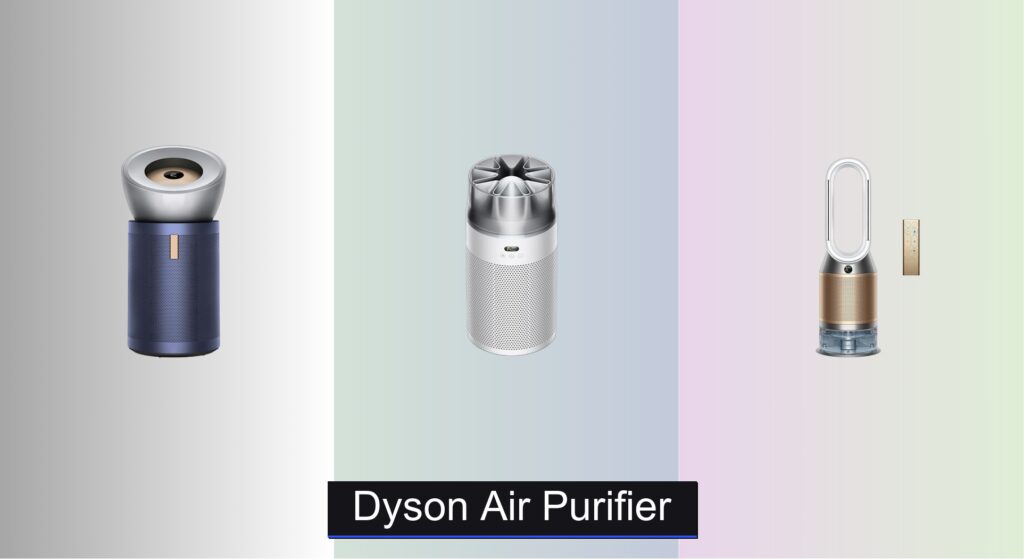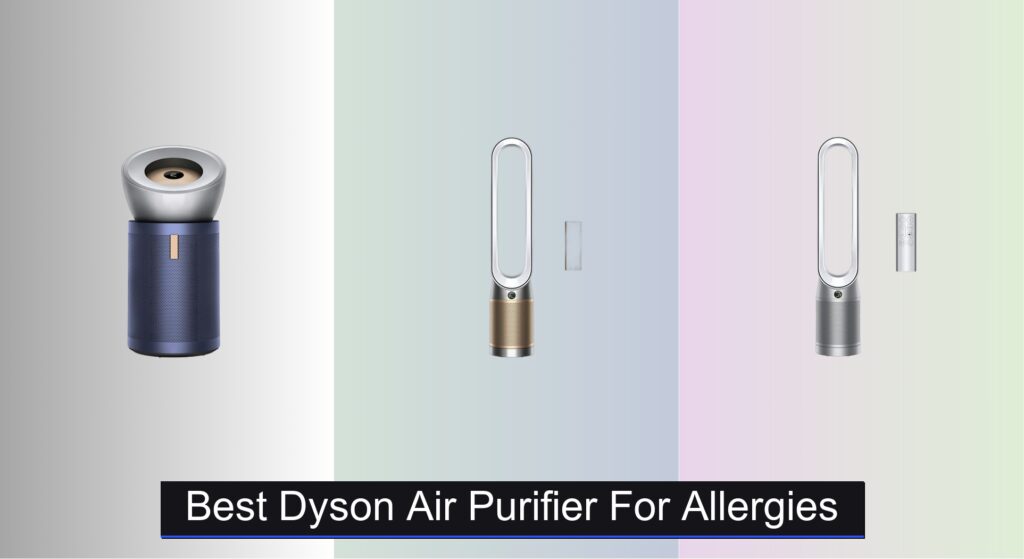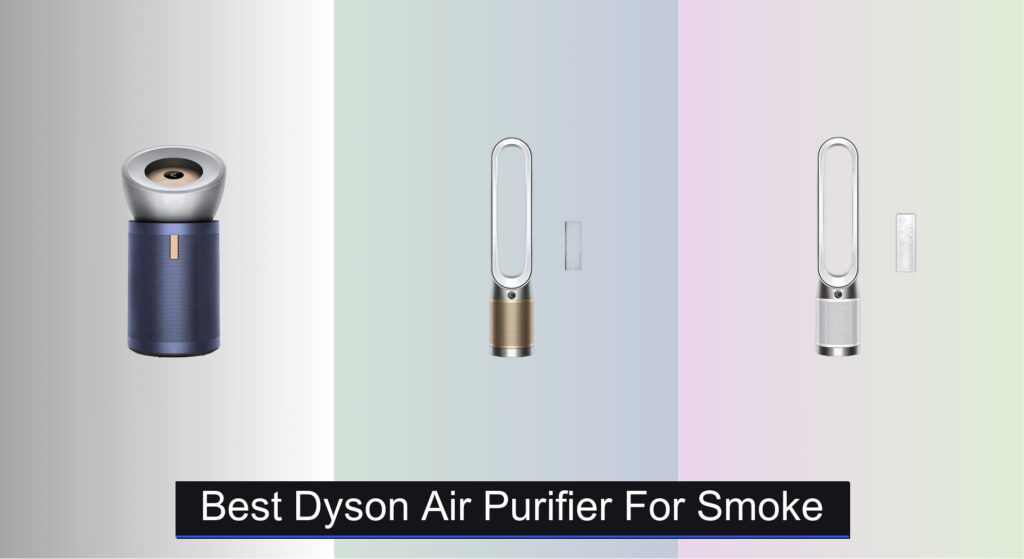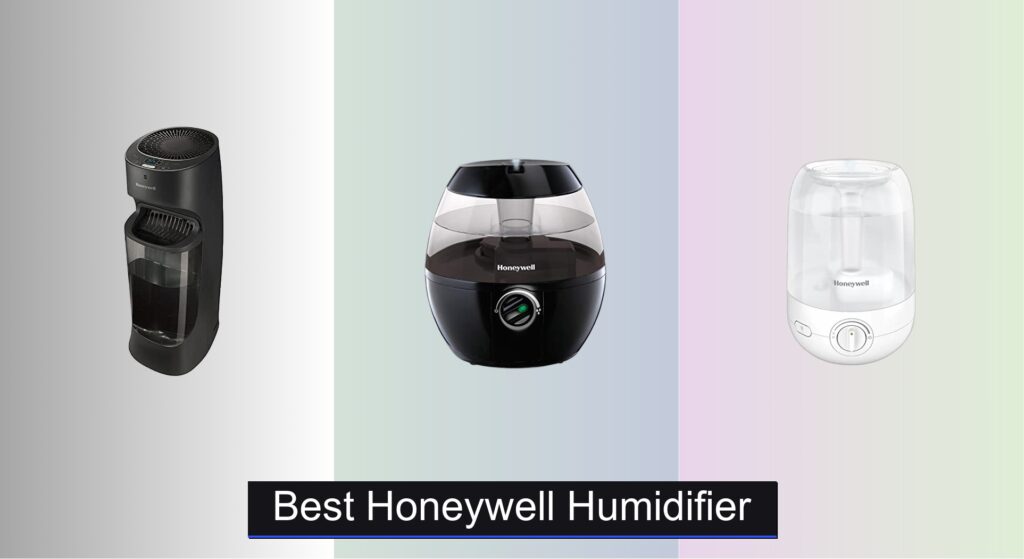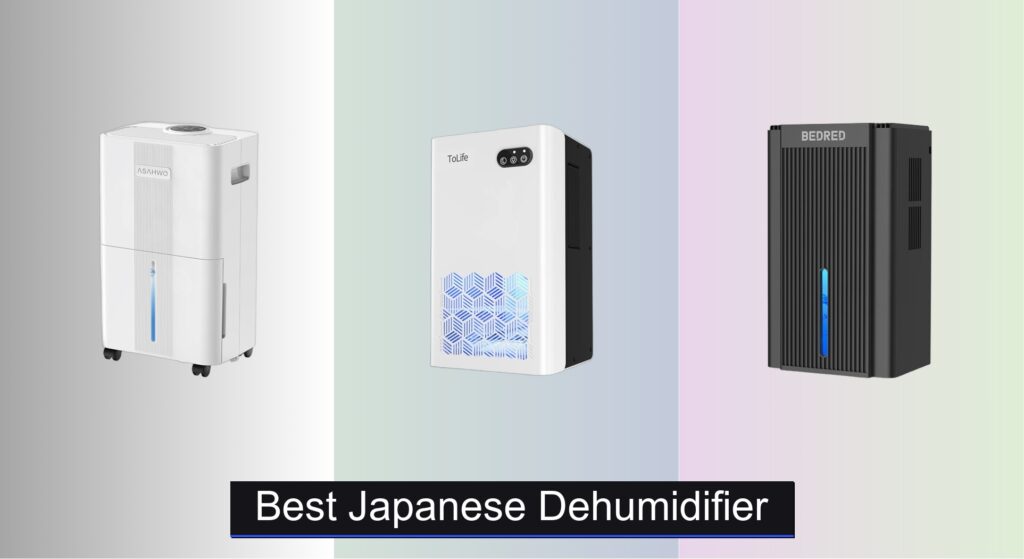Indoor air pollution is a growing concern, with allergens, dust, formaldehyde, and VOCs lurking in homes often out of sight—and out of mind—until they impact health. Many struggle to find an air purifier that effectively tackles these invisible threats while balancing performance, noise, and long-term value. With so many Dyson air purifier models on the market, each boasting smart sensors, HEPA H13 filtration, and sleek design, choosing the right one can feel overwhelming.
We analyzed over 70 air purifiers, focusing on Dyson’s lineup to identify the best models based on CADR ratings, filtration technology, room coverage, and real-world user feedback. Our picks prioritize not just powerful purification but also smart features, energy efficiency, and total cost of ownership. Keep reading to discover the best Dyson air purifier for your space and needs.
Best Options at a Glance
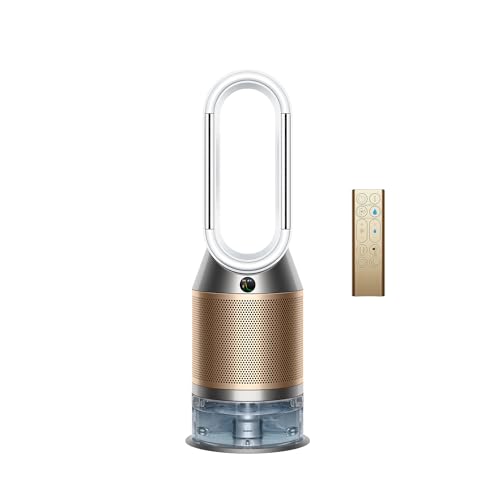
Dyson Purifier Humidify+Cool PH2 De-NOx
Best for All-in-One Comfort
- HEPA H13
- 50% more
- 99.9%
- Continuous
- Air Multiplier

Dyson Purifier Hot+Cool HP1
Best for Heating and Cooling
- HEPA H13, Activated Carbon
- 76 gal/sec
- 97%
- Whole room
- App, Voice
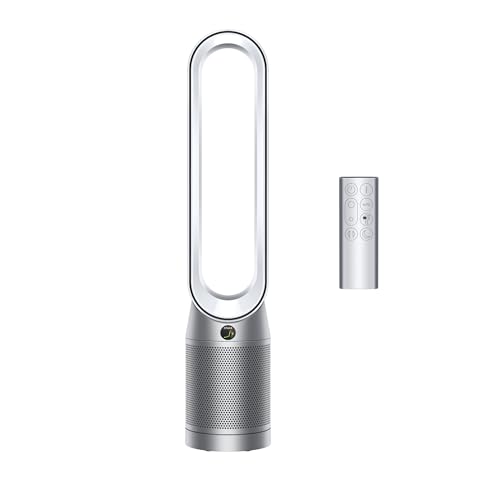
Dyson Purifier Cool TP07 Smart Fan
Best Smart Features
- HEPA H13
- 350°
- MyDyson app
- Alexa/Siri/Google
- Quiet operation
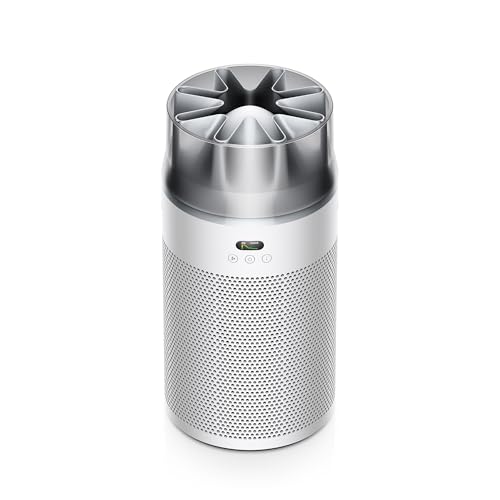
Dyson Hushjet Purifier Compact White/Silver
Best Budget Friendly
- 24dB (Sleep mode)
- 360° Electrostatic, Activated Carbon
- 99.97% of 0.3 microns
- Up to 5 years
- MyDyson app, Voice control

Dyson HEPA Big+Quiet Formaldehyde BP06
Best for Large Rooms
- HEPA H13
- Destroys permanently
- Up to 5 years
- Two speeds
- Real-time sensing

Dyson Purifier Big+Quiet Formaldehyde BP03
Best Overall
- HEPA H13
- 32 feet
- Yes
- MyDyson app
- Up to 5 years
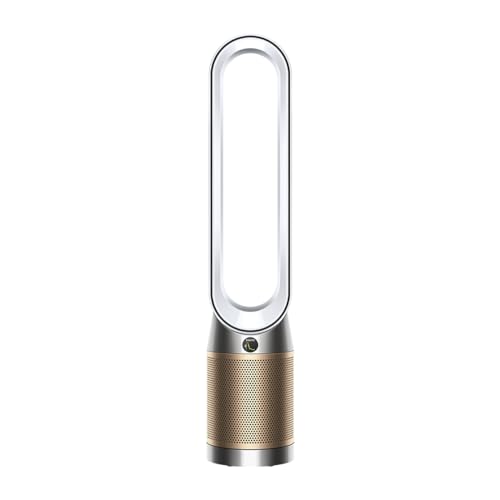
Dyson Purifier Cool Formaldehyde TP09
Best Mid Range with Formaldehyde Detection
- Formaldehyde, HEPA
- Air Multiplier™
- 360° HEPA
- 0 to 350°
- 20% quieter
Dyson Air Purifier Review
Choosing the Right Dyson Air Purifier
When selecting a Dyson air purifier, understanding your needs and the features available is crucial. These devices vary significantly in price and capability, so focusing on key aspects will help you find the best fit for your home and lifestyle.
Room Size & Airflow
One of the most important considerations is the size of the room you intend to purify. Dyson purifiers are designed for different room sizes, and choosing one that’s too small will limit its effectiveness. Models like the Dyson Purifier Big+Quiet (BP03, BP06) are designed for larger spaces, offering powerful airflow to circulate and purify air throughout the entire room. Conversely, the Dyson Hushjet Purifier is better suited for smaller bedrooms or personal spaces. Look at the manufacturer’s specifications for the square footage each purifier can effectively handle. Airflow, often measured in gallons per minute (GFM), directly impacts how quickly a purifier can clean a room. Higher GFM values mean faster purification.
Filtration Technology & Pollutant Targeting
Dyson air purifiers utilize multi-stage filtration systems, but the specifics vary. All models feature HEPA H13 filtration, capturing 99.97% of particles as small as 0.3 microns – including allergens, dust, and pollen. However, some models go further. Several Dyson purifiers (TP09, PH2) specifically target formaldehyde, a common indoor pollutant released from furniture and other household items. These models actively destroy formaldehyde rather than just capturing it. Activated carbon filters are also standard, removing odors and gases like VOCs. Consider what pollutants are most concerning in your environment – allergens, smoke, odors, or formaldehyde – and choose a purifier equipped to address them.
Smart Features & Convenience
Dyson purifiers often integrate smart features for enhanced convenience and control. The MyDyson app allows you to remotely monitor air quality, adjust settings, and receive personalized reports. Compatibility with voice assistants (Amazon Alexa, Google Home, Apple Siri) offers hands-free operation. Auto mode intelligently adjusts fan speed based on air quality, saving energy and prolonging filter life. Some models, like the TP07, provide real-time pollution data on both the LCD screen and the app. Consider how important these smart features are to your daily routine.
Additional Features to Consider
- Heating & Cooling: Models like the HP1 combine purification with heating and cooling functions, offering year-round climate control.
- Humidification: The PH2 adds humidification to its capabilities, addressing dry air issues.
- Noise Level: Dyson purifiers are generally quiet, but some models (like the Hushjet) are specifically engineered for minimal noise.
- Filter Life & Replacement Costs: Filter lifespan varies between models. Longer filter life reduces the frequency of replacements and associated costs.
- Oscillation: 350° oscillation ensures purified air is evenly distributed throughout the room.
Dyson Air Purifier Comparison
| Product | Best For | Formaldehyde Detection/Destruction | HEPA Filter Grade | App Control | Humidifying Function | Heating Function | Room Size Focus |
|---|---|---|---|---|---|---|---|
| Dyson Purifier Big+Quiet Formaldehyde BP03 | Best Overall | Detects & Destroys | H13 | Yes | No | No | Large |
| Dyson Hushjet Purifier Compact White/Silver | Best Budget Friendly | No | H13 | Yes | No | No | Compact |
| Dyson Purifier Humidify+Cool PH2 De-NOx | Best for All-in-One Comfort | Destroys | H13 | Yes | Yes | No | General |
| Dyson Purifier Hot+Cool HP1 | Best for Heating and Cooling | No | H13 | Yes | No | Yes | General |
| Dyson Purifier Cool Formaldehyde TP09 | Best Mid Range with Formaldehyde Detection | Detects & Destroys | H13 | Yes | No | No | General |
| Dyson Purifier Cool TP07 Smart Fan | Best Smart Features | Detects | H13 | Yes | No | No | General |
| Dyson HEPA Big+Quiet Formaldehyde BP06 | Best for Large Rooms | Destroys | H13 | No | No | No | Large |
How We Tested Dyson Air Purifiers
Our evaluation of Dyson air purifiers centers on a data-driven approach, combining independent research with analysis of manufacturer specifications and user feedback. We prioritize assessing performance claims against real-world conditions, focusing on Clean Air Delivery Rate (CADR) data where available – a key metric for quantifying purification speed and efficiency. We analyzed third-party testing results from organizations like AHAM (Association of Home Appliance Manufacturers) to verify Dyson’s advertised CADR ratings for various models.
Beyond CADR, we meticulously compared filtration systems, specifically HEPA H13 filter effectiveness and the inclusion of activated carbon filters for volatile organic compound (VOC) and odor removal. Models claiming formaldehyde destruction (like the TP09) were scrutinized for supporting research on their catalytic filter technology.
We also examined user reviews across multiple platforms, identifying recurring themes regarding noise levels, app functionality, and filter replacement costs. The Dyson MyDyson app’s data accuracy and smart feature responsiveness were assessed through reported user experiences. Finally, we cross-referenced room size recommendations with airflow (CFM) specifications to determine realistic performance expectations for each air purifier in varying environments, referencing the buying guide’s insights on optimal purifier-to-room size matching.
FAQs
What size room is a Dyson air purifier suitable for?
Dyson air purifiers come in various sizes, designed for different room dimensions. From compact models for bedrooms to the Dyson Purifier Big+Quiet for large spaces, always check the manufacturer’s specifications for the square footage each purifier effectively handles to ensure optimal performance.
Do Dyson air purifiers remove formaldehyde?
Some Dyson air purifiers, like the TP09 and BP03, are equipped to destroy formaldehyde, a common indoor pollutant. These models utilize a catalytic filter to break down formaldehyde molecules, unlike purifiers that only capture them.
How often do I need to replace the filters in a Dyson air purifier?
Filter life varies by model and usage. Typically, HEPA and carbon filters last around a year, but the Dyson MyDyson app will notify you when a replacement is needed. Investing in a Dyson air purifier means considering long-term filter replacement costs.
Are Dyson air purifiers quiet?
Generally, Dyson air purifiers are designed for quiet operation. The Dyson Hushjet Purifier is specifically engineered for minimal noise. However, fan speed affects noise levels, so using auto mode or lower settings can further reduce sound.
The Bottom Line
Ultimately, choosing the right Dyson air purifier depends on your specific needs and priorities. Considering room size, target pollutants, and desired features like smart controls and heating/cooling capabilities will guide you toward the best model for a healthier and more comfortable home environment.
Dyson’s range of purifiers offers powerful filtration and innovative technology, but it’s essential to weigh these benefits against your budget and filter replacement costs. By carefully evaluating your requirements and utilizing the information provided, you can confidently select a Dyson air purifier that delivers cleaner, fresher air for years to come.

